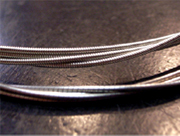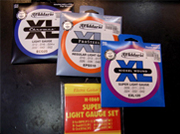Choosing an Electric Guitar
Types of strings and how to choose which ones to use
Choosing based on materials or shape
Guitar strings are consumables.They should be replaced every month if possible-and of course prior to playing on stage. It is a good idea to keep one or two sets of strings in your case at all times. Of course, there are many kinds of strings suited for a variety of uses and purposes. Although strings are wound using several methods, roundwound strings are most commonly used. These strings feature a ridged texture that is similar to the edge of a coin. These strings are typically made of nickel. They provide an "electric-like" timbre with a strong attack response. For a sharper sound, consider using pro steel strings, which use a stainless steel alloy. These strings are recommended if you are looking for a sound that is a bit more dazzling. In contrast with ridged roundwound strings, flatwound strings are finished with a smooth surface. These strings are known for their mild and deep tone, and produce very little "grinding" when attacking the strings. They are mainly used on jazz guitars. Due to their smooth finish, a guitarist's fingers can slide across the strings for extremely smooth fingerwork.

Top: Roundwound; Bottom: Flatwound

Several kinds of electric guitar strings. Top row from L-R: D'Addario flatwound strings, pro steel electric guitar strings, and nickel electric guitar strings; Bottom row: Yamaha H-1060 electric guitar string set
Choosing based on thickness
The thickness of a string affects the sharpness and tone of its sound. In most cases, the packaging for a set of strings will indicate the gauge (thickness) of string 1. You can use this as a guide in selecting your strings. If string 1 has a thickness of 0.009 inches the gauge will often be indicated as 09. Likewise, the gauge will be 10 if string 1 has a thickness of 0.010 inches. Generally speaking a 09 or 10 gauge set is recommended. However, guitarists who bend a lot when playing will want to choose the slightly thinner 09 set. Although thinner strings are easier to pluck, thicker strings produce a fuller sound. The best method of course is to try several kinds of strings and discover those that best match your playing style.
Musical Instrument Guide:Electric Guitar Contents
Structure
How to Play
How the Instrument is Made
Choosing an Instrument
Care and Maintenance
Trivia
- Slide guitar playing may have been invented in a bar
- Feedback:Great for guitar playing! Not so great for karaoke...
- What is the difference between an electric guitar and electric acoustic guitar?
- Is there a way to eliminate the noise heard when plugged into an amplifier?
- Whole note down tuning for deeper bass
